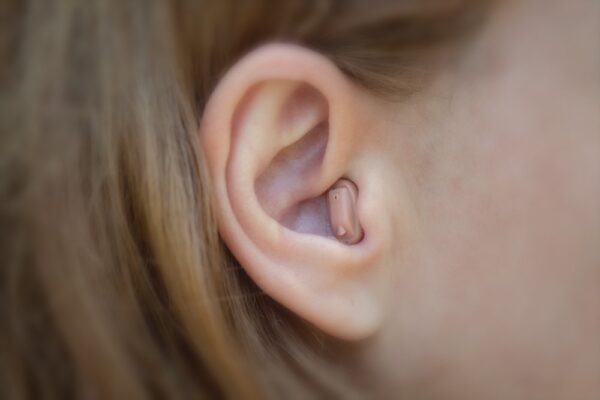
Have you ever been in the middle of a conversation and suddenly heard a high-pitched, annoying whistle coming from your hearing aid? It’s a common problem that can be frustrating and embarrassing. But don’t worry, you’re not alone.
At Regain Hearing, one of the most common questions we hear (no pun intended) is, “Why does my hearing aid whistle?” If you experience a whistling sound in your hearing aid, don’t worry. This article will discuss some simple solutions you can try at home and explain when to consult your audiologist. So, let’s dive into the common problems with hearing aids and learn how to troubleshoot each one.
9 Reasons Why Your Hearing Aid Might Whistle
1. Poor Fit
Reason — If your hearing aid doesn’t fit properly, it can cause sound leakage, resulting in feedback and whistling.
Troubleshooting — You can quickly fix this by adjusting the fit of the hearing aid or trying a different size or style of earpiece. It is essential to have a proper fitting done by an audiologist, to ensure that you know how to choose the proper hearing aids for the shape of your ear.
2. Incorrect Placement
Reason — Getting used to inserting your hearing aid can take time, and the correct position and placement are crucial for preventing whistling.
Troubleshooting — Another factor to consider is the hearing aid being used. Some hearing aids are designed to sit behind the ear, while others sit inside the ear canal. The position and fit of the hearing aid will vary depending on the hearing aid being used. Your audiologist can provide guidance on the best type of hearing aid for your specific needs and preferences.
3. Earwax Buildup
Reason — Earwax is a natural substance that protects our ears, but may cause hearing aid feedback and whistling when there’s a buildup.
Troubleshooting — You can try using earwax drops, or you can have microsuction earwax removal performed by an audiologist. Never try to dig wax out with earbuds or anything else, as you could easily cause a perforated eardrum, and you will also push the wax further into your ear canal,
4. Low Battery
Reason — The hearing aid may not function correctly and produce feedback when the battery is low.
Troubleshooting — Always check your hearing aid is turned off when it is not in use, and check how often the batteries need replacing to prevent this issue.
5. Damaged Device
Reason — Sometimes, hearing aid whistling can be caused by damage to the device. A crack or break in the casing or tubing can allow sound to leak out and cause feedback.
Troubleshooting — You can try to replace tubing in some devices, but if you are unsure, you should visit your audiologist and ask for your hearing aid to be checked for damage. If your hearing aid is whistling and is over five years old, it may need to be replaced. However, in most cases, modern digital hearing aids can be repaired.
6. Interference
Reason — Sometimes, hearing aids can pick up interference from other electronic devices, which can cause feedback and whistling.
Troubleshooting — This can happen if your hearing aid is set to the wrong programme. Visit your audiologist for advice and help to adjust the programming to resolve this issue.
7. Hearing Aid Needs to be Cleaned
Reason — Wax and small pieces of dust and debris can accumulate over time and block the sound from the hearing aid, causing feedback.
Troubleshooting — Regular cleaning of your hearing aid can prevent this issue.
8. Volume Too High
Reason — If the volume on your hearing aid is too high, it can cause feedback and whistling.
Troubleshoot — Remove your hearing aid, reduce the volume, and turn it off before reinserting it. Turn it on again once it is in a comfortable position.
9. Environmental Factors
Reason — Wind or background noise can cause whistling.
Troubleshooting — Features such as directional microphones or adaptive noise reduction settings on hearing aids can help to reduce feedback. You may need to change your hearing aid if you still have issues.
How to Choose the Correct Hearing Aid
Are you experiencing hearing problems? Don’t ignore them; they can affect your quality of life more than you think. Many providers provide fast, free hearing checks, or you may also be considering buying “one size fits all” hearing aids online. Still, there are some compelling reasons to consult an independent audiologist.
First, an audiologist is a hearing expert with years of training and the depth of knowledge to fully evaluate and treat all types of hearing loss. They have the latest equipment and technology to perform accurate hearing tests and the ability to interpret the results and diagnose any problems.
Additionally, modern digital hearing aids have much to offer, and there are many features and programme settings, such as Bluetooth technology and directional microphones. An independent audiologist can provide you with the largest selection of hearing aids on the market. Finally, an independent audiologist who is a member of the British Society of Hearing Aid Audiologists (BSHAA) is committed to providing the best possible care and focused on finding the right solution for your individual needs.
Hearing loss doesn’t have to be a barrier to enjoying life’s moments. With the right provider, you can regain control of your hearing and stay connected to the people and experiences you love. You will receive an expert diagnosis and solutions tailored to your unique needs by choosing an audiologist you can trust. Don’t settle for anything less when it comes to your hearing health.
At Regain Hearing, our experienced audiologists offer the most advanced hearing tests and a wide choice of hearing aids. Plus, we provide lifetime aftercare. Please call or fill in our form to arrange a hearing test at one of our Regain Hearing clinics in London, Kent and Essex.
